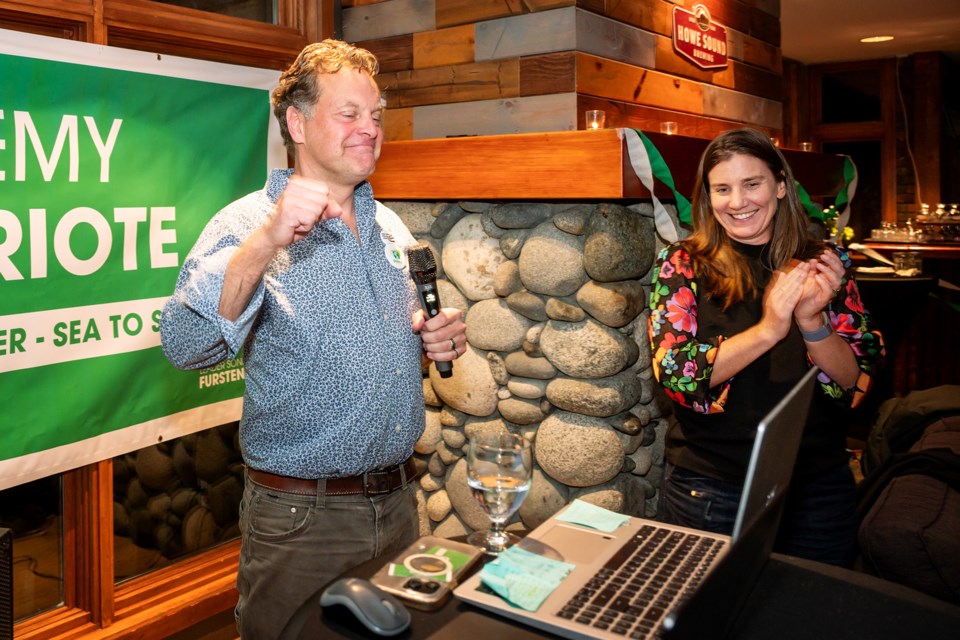On the campaign trail this fall, BC Green candidate Jeremy Valeriote’s marriage to the Resort Municipality of Whistler’s (RMOW) top bureaucrat, CAO Ginny Cullen, was brought up several times by both constituents and candidates as a possible conflict of interest.
Now that Valeriote has been elected provincial MLA for West Vancouver-Sea to Sky, Pique wanted to unravel the practical implications of this perceived conflict. According to University of BC political science lecturer Stewart Prest, the main concern would be if either Valeriote or Cullen have a direct financial interest in a decision or situation arising from their respective roles.
“Where conflict of interest really kicks in is when there is a potential pecuniary interest where someone could benefit from the interaction taking place. Those concrete situations where there is a conflict of interest would be relatively rare,” said Prest.
That was reiterated by B.C.’s Office of the Conflict of Interest Commissioner, an independent commission that provides advice to members of the Legislative Assembly concerning their obligations under the Members’ Conflict of Interest Act. Declining to comment on any potential conflict in the absence of a specific allegation of wrongdoing, the commission provided some general information on how members are expected to manage conflict.
“It is important to note that Members may have many ‘potential’ conflicts of interest as a result of their individual circumstances. Members come from all walks of life, and many have spouses or other family members engaged in employment or business activities that could be affected by government programs, legislation or other decisions,” the statement reads in part. “A concern only arises if at some point there is an opportunity for the Member to exercise an official power or perform an official duty that would further their private interest.”
In such a case, members should disclose the conflict and recuse themselves from the decision-making process, a normal occurrence for elected officials at all levels of government.
“I also checked in with the commissioner and got the same advice,” Valeriote said. “If there is no private financial interest involved, I think what we will commit to is, if there is any potential for perceived conflict, then one of us would step out of a discussion—but I don’t really foresee that happening.”
Getting in front of any perceived conflict will be important for engendering trust with constituents, Prest said.
“I think the perception of conflict can outrun even the situations where it does occur, so that’s going to be a real challenge for the couple in question. It is the kind of situation where both Mr. Valeriote and Ms. Cullen are going to have to find ways to get ahead of the curve on the issue and demonstrate they are taking this seriously and mitigating any potential conflict when they’re working on related files,” he said. “It’s important for the people of Whistler to know these decisions are happening in a fair and unbiased manner.”
At a Pemberton all-candidates meeting ahead of October’s provincial election, NDP hopeful and current Whistler Councillor Jen Ford brought up the possibility of conflict at advocacy meetings in Victoria.
“My experiences as a current elected official, three times elected in Whistler and at the [Squamish-Lillooet Regional District], is that when we go to advocate with the province on behalf of our community, we take our MLA with us. Typically, that MLA provides support,” she said at the time. “If that person can’t go, free of conflict, to that advocacy meeting, it’s a challenge for the local council.”
Because both Valeriote and Cullen are expected to work on behalf of Whistler in their respective roles, Prest doesn’t see a conflict “by any means” with Valeriote attending advocacy meetings alongside Whistler officials.
“But it doesn’t get away from that perceptual issue, even if [Valeriote and Cullen] are making similar arguments in the best interest of their constituents,” he added. “Communication, transparency can go a long way in situations like this.”
Asked if he foresaw any potential conflict involving a provincial decision that would directly benefit Whistler, Valeriote said he can only envision such a scenario “if Whistler was getting more benefits than other communities in the riding. But that’s something that an ethical and fair-minded person wouldn’t allow to happen.”






